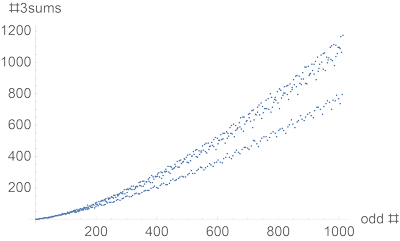From Harald Helfgott's proof of Goldbach's weak conjecture,1 we know that every odd number $> 7$ is the sum of three odd primes. If $n$ is such an odd number, say that two sums that yield $n$ are distinct if they are distinct as sorted lists. So $n=13$ has just two distinct sums, $(3,3,7)$ and $(3,5,5)$.
Q1. Are $9=3+3+3$ and $11 = 3+3+5$ the only two odd numbers $> 7$ that have unique sums of three odd primes?
Call a sum of three odd primes as a $3$-sum for conciseness. Here are the first few odd numbers and their $3$-sum lists: $$ \left| \begin{array}{ccc} n & 3{-}sums & \#3{-}sums\\ \hline 9 & (3,3,3) & 1\\ 11 & (3,3,5) & 1\\ 13 & (3, 3, 7),\; (3, 5, 5) & 2\\ 15 & (3, 5, 7),\; (5, 5, 5) & 2\\ 17 & (3, 3, 11),\; (3, 7, 7),\; (5, 5, 7) & 3 \end{array} \right| $$
Here is a plot of the number of $3$-sums for odds up to about $1001$:

Q2. What explains the separation into two distinguishable series?
So for $n=975$, there are $701$ $3$-sums:
\begin{eqnarray} &(3, 5, 967)\\ &(3, 19, 953)\\ &(3, 31, 941)\\ &\cdots\\ &(313, 313, 349)\\ &(313, 331, 331) \end{eqnarray}
But for $n=977$, there are $1106$ $3$-sums. Here is a bit more data: $$ \left| \begin{array}{cc} n & \#3{-}sums \\ \hline 975 & 701 \\ 977 & 1106 \\ 979 & 1010 \\ 981 & 758 \\ 983 & 1113 \\ 985 & 977 \\ 987 & 756 \\ 989 & 1110 \\ 991 & 1037 \\ 993 & 791 \\ 995 & 1056 \\ 997 & 1096 \\ 999 & 770 \\ 1001 & 1095 \\ \end{array} \right| $$
1MO: Proof of the weak Goldbach Conjecture .
